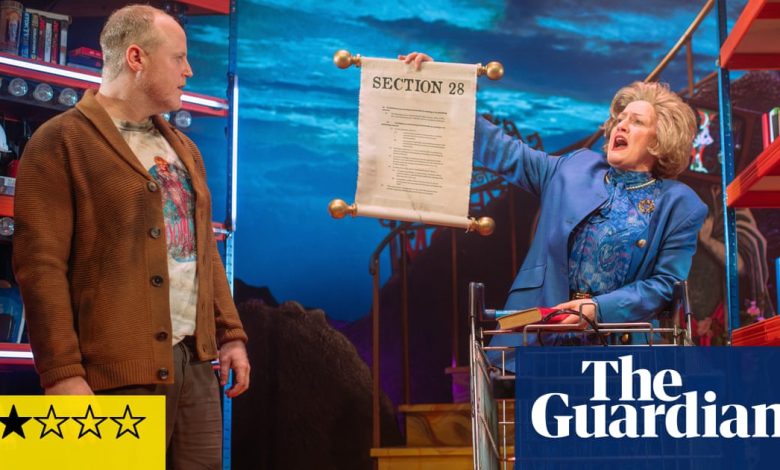Maggie & Me review – Damian Barr’s raw memoir gets an overcooked staging | Stage

[ad_1]
Oon the page Damian Barr’s 2013 memoir is subtle and seductive. His coming-of-age tale is like a Scottish version of the French writer’s Eddie’s End Edward Lewis; two first-person accounts of growing up gay and working-class in declining industrial areas in the late 20th century. Both authors present themselves as bright and sensitive, ill-equipped to deal with the domestic violence, homophobia and bullying that beset them.
Just as Lewis understood his life in terms of political choices, Barr saw an equivalence between the end of steelmaking at Ravenscraig in North Lanarkshire, the iniquities of the government’s section 28 homophobic legislation and the messianic individualism of Prime Minister Margaret Thatcher. Each is an expression of cruelty.
Television is the only salvation, which is why designer Kenneth McLeod scatters screens throughout his set for this National Theater of Scotland production, much like the designers of The end of Eddie have done before him.
But where this is implicit in the print edition, it is made abundantly clear in Barr’s own adaptation, written with James Lee. Breaking free from the literal version of the book, the playwrights frame the story from the point of view of a grown-up author (Gary Lamont) struggling to find the words to express the traumas of his childhood. Maggie & Me emerges from a therapy session in which the writer comes face to face with his childhood self (Sam Angel) and comments on what it all means.
On the plus side, the approach allows for a variety of storytelling techniques, from karaoke sessions to TV quizzes, while, with a nod to Angels in America, Thatcher (Bette Marshall) stalks the scene like an untamed monster. On the other hand, it sentimentalizes those aspects of the book that were raw and underappreciated. He turns a delicate account of a brutal upbringing into a dark play about a man with writer’s block.
There are glimpses of the crude humor that Leigh brings to plays such as Ode to Joy and Wilf, but any freedom in the writing is weighed down by the clunky setting in an overlong production by Suba Das. After the writers have turned the book inside out, Das folds it back in with a production that’s clumsy and tonally uncertain.
[ad_2]




